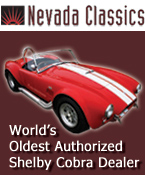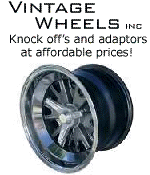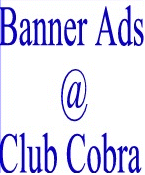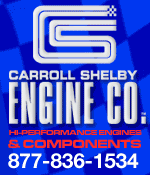 
 Main Menu
Main Menu
|
 Nevada Classics
Nevada Classics
|
 Advertise at CC
Advertise at CC
|
 February 2025
February 2025
|
| S |
M |
T |
W |
T |
F |
S |
| |
|
|
|
|
|
1 |
| 2 |
3 |
4 |
5 |
6 |
7 |
8 |
| 9 |
10 |
11 |
12 |
13 |
14 |
15 |
| 16 |
17 |
18 |
19 |
20 |
21 |
22 |
| 23 |
24 |
25 |
26 |
27 |
28 |
|
|
 CC Advertisers
CC Advertisers
|
|

02-22-2006, 04:21 PM
|
|
CC Member

|
|
|
Join Date: Jun 2003
Cobra Make, Engine: ERA 427 w/496 Side Oiler, roller, dual quads
Posts: 417
|
|

 Not Ranked
Not Ranked
 Inexpensive forged FE stroker crank?
Inexpensive forged FE stroker crank?
Using a 391 crank:
Offset grinding a 391 crank to BB Chevy bearing size could achieve a 4.256" stroke; by offset grinding only to a 4.250" stroke, you would assure a fully ground journal. Offset grinding may also remove enough metal so that little or no heavy metal is needed to internally balance the crank. The Chevy bearing is a bit wider, I don't know if that would weaken the crank? If this will work, I think it might be able to be done for no more, possibly less, than a Scat "Cast Steel" stroker.
Obviously, I'm looking for comments on this idea.
390 = 3.78" stroke, 2.4384 inch rod journal diameter.
BB Chevy=2.2" rod journal diameter.
.238" difference (doubled)=4.256" stroke
__________________
Do you know why they call it "PMS"? Because "Mad Cow Disease" was taken. --Unknown, presumed deceased
|
-
Advertising


02-22-2006, 04:26 PM
|
|
CC Member

|
|
|
Join Date: Dec 2001
Location: Louisville,
KY
Cobra Make, Engine: I'm Cobra-less!
Posts: 9,417
|
|

 Not Ranked
Not Ranked
I think for the price of all the machine work you're gonna be in for, you could have a new Scat crank.
You're gonna have to turn down the snout, the flywheel flange, plus offset grind the rod journals....then turn the mains down.
Added to that, 391 cranks are not cross drilled.....so that would be an added expense plus any polishing and chamfering you'd wanna do.
I say go for the Scat. Keith Craft uses them on all his stroker engines. I have a new Scat 3.98 crank...and I have no worries...
|

02-22-2006, 05:30 PM
|
 |
CC Member

|
|
|
Join Date: May 2004
Location: Palm Coast,
FL
Cobra Make, Engine: Shelby American CSX 4241 - authentically built
Posts: 2,573
|
|

 Not Ranked
Not Ranked
Yeah, seriously. You'd spend way more in machine work to that 391 crank than it would cost to buy a brand new Scat stroker crank.
__________________
Sal Mennella
CSX 4241, KMP 357 - sold and missed, CSX 4819 - cancelled, FFR 5132 - sold
See my car at CSXinfo.net here >> CSX 4241
|

02-22-2006, 08:16 PM
|
 |
CC Member

|
|
|
Join Date: Mar 1999
Location: Pittsburgh,
PA
Cobra Make, Engine: Midstates, 427FE stroked to 482CI
Posts: 134
|
|

 Not Ranked
Not Ranked
Carnut,
Your math is off. To increase stroke, you must move the centroid of the rod journal down. So, when offset grinding, you would leave the bottom of the journal at its present location...cause you cant go any lower...and cut at the the top of the journal. The new journal centroid for the BBC journal would be at 1.1" from bottom. The original stock centroid was at 1.2192" from journal bottom. So, the new effective centroid moved .1192" down. Hence, your new stroke would be 3.78" + .1192" = 3.899" This is max stroke for this combo.
However, some shops can weld more material to the bottom of each journal to increase stroke even further...but this is expensive...call Kieth Craft. I sold kieth all 4 of my 391 cranks...he machines them and sells them to racers who like to spin them at 7500 rpm. Forged steel units are great cranks, but for $500 bucks...you cant beat the cast iron scat cranks in 4.125 or 4.25" strokes.
Last edited by STEVE POTTS; 02-22-2006 at 08:20 PM..
|

02-22-2006, 11:17 PM
|
|
CC Member

|
|
|
Join Date: Jun 2003
Cobra Make, Engine: ERA 427 w/496 Side Oiler, roller, dual quads
Posts: 417
|
|

 Not Ranked
Not Ranked
Keith doesn't put Scat cast cranks ($695) in all his stroker motors; those with the cash put in a billet ($2495), which is much stronger.
Steve, I'll definitely admit my math could be wrong, as this sort of thing gets pretty fuzzy for me. It still seems to me that you want to move the centroid of the journal up, not down, to increase stroke. However, I'll give it some more thought after the smoke stops coming out of my ears and possibly understand your explanation. As to the Scat crank, I've already got one in my 496. If money (and value) were no object, I'd have a billet stroker instead for the increased strength. I won't take my engine above 5700 with the cast crank, it's the weak link. I came up with this possible idea in my quest for a forged crank, much stronger than a cast one, and cheaper than a billet.
Thanks to all,
Dan
__________________
Do you know why they call it "PMS"? Because "Mad Cow Disease" was taken. --Unknown, presumed deceased
|

02-22-2006, 11:29 PM
|
|
CC Member

|
|
|
Join Date: Jun 2003
Cobra Make, Engine: ERA 427 w/496 Side Oiler, roller, dual quads
Posts: 417
|
|

 Not Ranked
Not Ranked
Quote:
|
Originally Posted by Carnut427
It still seems to me that you want to move the centroid of the journal up, not down, to increase stroke.
|
Steve, you're looking at the crank with the journal rotated to the bottom of it's stroke, and I'm looking at it with the journal at the top of it's stroke. It's possible we're both wrong on the math. When changing stroke, you add the change to both the top and bottom of the stroke, giving, according to your figures, a max 4.0184 stroke.
Dan 
__________________
Do you know why they call it "PMS"? Because "Mad Cow Disease" was taken. --Unknown, presumed deceased
Last edited by Carnut427; 02-22-2006 at 11:38 PM..
|

02-23-2006, 01:05 AM
|
|
CC Member

|
|
|
Join Date: Mar 2003
Location: Arkadelphia, AR,
AR
Cobra Make, Engine: Kirkham 427 brushed aluminum with Keith Craft 527C.I. all aluminum FE
Posts: 992
|
|

 Not Ranked
Not Ranked

The difference in the BBChevy journal which is 2.200 and the FE Ford journal which is 2.438 is .238 so with the 391 truck crank having a stroke of 3.784 you can stroke it .238 thousands with a perfect crank. We will stroke most of them to 4.000. You could possible get 4.020 stroke with everything just right. We do these for some race applications where you can not run more stroke than this or if a customer wants a steel crank but does not want to spend 2400.00. You have to remember they are about 35 years old and were used in heavy trucks so they had a pretty rough life. I have made up to 800HP with these cranks but have also had some cracked when we freshened the engine and wet magged the crankshaft which we do on all of our engines. You will spend at least 800.00 easy doing one of these cranks right if you have the core. You have to turn down the nose and re key it, machine the back of the crank for a spacer to bring back to the right size for converter or regular transmission pilot bearing. Of set grind the crankshaft and either widen the rod throw by side grinding into the counter weights which is quite expensive or narrow the rods and leave the crankshaft the stock width and narrow the rods and rod bearings. This is not the ideal project for the regular guy trying to save money. The Scat cast steel cranks arwe good for up to about 750HP. I have had some out there for about 2 years that are making between 700 and 7550 with them and no problems. I do use a lot of billet crankshafts for some of the higher end engines that will make a lot of power or for customers that just want a billet. Make sure the other parts that you have will handle 700HP before you worry to much about the crankshaft. Hope this helps and good luck, Keith
__________________
Keith C
|

02-23-2006, 01:36 AM
|
|
CC Member

|
|
|
Join Date: Jun 2003
Cobra Make, Engine: ERA 427 w/496 Side Oiler, roller, dual quads
Posts: 417
|
|

 Not Ranked
Not Ranked
Thanks for the info, Keith. I give myself an 'A' for effort even though my math was wrong (never my best subject). At the least, this post shows an interest in a forged stroker. As for my Scat cast crank, I don't want to be the one to find out they all won't take that much hp. It's not just the hp, it's also the RPMs with that long stroke, as the piston speed gets to the point where you want premium parts to keep it together past 5500-6000 RPM, and I don't consider the cast cranks a premium part, just something to get me by until a forged unit comes along. Call me cautious, I've blown a motor before and don't care to repeat the experience.
THANKS,
Dan
__________________
Do you know why they call it "PMS"? Because "Mad Cow Disease" was taken. --Unknown, presumed deceased
|

02-23-2006, 07:39 AM
|
 |
CC Member

|
|
|
Join Date: Mar 1999
Location: Pittsburgh,
PA
Cobra Make, Engine: Midstates, 427FE stroked to 482CI
Posts: 134
|
|

 Not Ranked
Not Ranked
Dan,math is one of my best subjects...scary huh!
Still learning about these engines, though. Thanks for the info...I reworked this on paper and I concurr...
Keith, Thanks for the info as well.
|

02-23-2006, 10:34 PM
|
|
CC Member

|
|
|
Join Date: Sep 2002
Location: Chicago, Oscar winner, my kind of town,
Posts: 614
|
|

 Not Ranked
Not Ranked

Quote:
|
Originally Posted by STEVE POTTS
Carnut,
Your math is off. To increase stroke, you must move the centroid of the rod journal down. So, when offset grinding, you would leave the bottom of the journal at its present location...cause you cant go any lower...and cut at the the top of the journal. The new journal centroid for the BBC journal would be at 1.1" from bottom. The original stock centroid was at 1.2192" from journal bottom. So, the new effective centroid moved .1192" down. Hence, your new stroke would be 3.78" + .1192" = 3.899" This is max stroke for this combo.
However, some shops can weld more material to the bottom of each journal to increase stroke even further...but this is expensive...call Kieth Craft. I sold kieth all 4 of my 391 cranks...he machines them and sells them to racers who like to spin them at 7500 rpm. Forged steel units are great cranks, but for $500 bucks...you cant beat the cast iron scat cranks in 4.125 or 4.25" strokes.
|
I had a 3.78 (Cast) crank taken out to 3.90. I used Ford Cleveland bearings. This kept everything FORD, and didn't require widening. When all done, the rotating assembly was zero-balanced with no mallory.
Cross-drilling is a waste (just my opinion) and actually a potential trouble-spot.
Nothing wrong with cast iron cranks. 391 cranks ARE nice, because they're steel and NOT cross-drilled. If you need all that. Most can get along with a cast crank.
Last edited by Sizzler; 02-27-2006 at 04:52 PM..
|

02-24-2006, 09:32 PM
|
|
CC Member

|
|
|
Join Date: Jun 2003
Cobra Make, Engine: ERA 427 w/496 Side Oiler, roller, dual quads
Posts: 417
|
|

 Not Ranked
Not Ranked
Quote:
|
Originally Posted by Sizzler
Nothing wrong with cast iron cranks. 391 cranks ARE nice, because they're steel and NOT cross-drilled. If you need all that. Most can get along with a cast crank.
|
Yes, cast cranks are fine for most purposes. However, when you get into a longer stroke such as 4.125 and larger, the piston has to travel a longer distance in each revolution; therefore even though two engines are turning the same RPM, the piston in the engine with the longer stroke is traveling much faster. When you reach a certain RPM, which varies by the stroke length, "normal" parts aren't good enough to take the abuse. That's when you need a stronger crank, rods, etc.
__________________
Do you know why they call it "PMS"? Because "Mad Cow Disease" was taken. --Unknown, presumed deceased
|

02-27-2006, 04:55 PM
|
|
CC Member

|
|
|
Join Date: Sep 2002
Location: Chicago, Oscar winner, my kind of town,
Posts: 614
|
|

 Not Ranked
Not Ranked
Quote:
|
Originally Posted by Carnut427
Yes, cast cranks are fine for most purposes. However, when you get into a longer stroke such as 4.125 and larger, the piston has to travel a longer distance in each revolution; therefore even though two engines are turning the same RPM, the piston in the engine with the longer stroke is traveling much faster. When you reach a certain RPM, which varies by the stroke length, "normal" parts aren't good enough to take the abuse. That's when you need a stronger crank, rods, etc.
|
I've honestly never heard of a cast crank failure in an FE, stroked or otherwise. It will usually be some other component or the block itself that lets go before the crank does. This all presupposes that the crank has been inspected for cracks or flaws before being installed.
This now becomes a thread about spectacular crank failures and the situations that brought them on. Let's hear the stories...
Last edited by Sizzler; 02-27-2006 at 04:57 PM..
|

02-28-2006, 12:29 AM
|
|
CC Member

|
|
|
Join Date: Jun 2003
Cobra Make, Engine: ERA 427 w/496 Side Oiler, roller, dual quads
Posts: 417
|
|

 Not Ranked
Not Ranked

Quote:
|
Originally Posted by Sizzler
I've honestly never heard of a cast crank failure in an FE, stroked or otherwise. It will usually be some other component or the block itself that lets go before the crank does. This all presupposes that the crank has been inspected for cracks or flaws before being installed.
|
I don't know how to put this and not sound like a smart-a$$, and I really don't mean to be, but I've still got to speak my mind...yes, I had my scat 4.250" stroke crank magnefluxed before I installed it. If you'll pay for the cost of a rebuild, I'll gladly take the engine to 6,000 - 6,250 RPM, where it makes it's peak power. I've got a Genesis block with main studs, shouldn't be any problem with that, Eagle 6.7" ESP rods, shouldn't be a problem there, and I have Crower HIPPO solid roller lifters, so there shouldn't be a problem there either. I also have Edelbrock Stage 3 heads by Keith Craft. This engine accelerates so much quicker than my previous 427 SO that they're not anywhere near being in the same league, and my old one ran a best of 12.16 @ 122mph on street tires at 1100' elevation. What it comes down to is the cast crank is the weakest link in this build, and I choose not to take it above what I consider the max RPM that it can safely handle, which is around 5500 RPM. I'm still working on my shift reaction time (the car is still faster than I am at times), have the shift light come on at 5,000 RPM and still hit the rev limiter, which is set at 5700 when shifting into both 2nd & 3rd. Part of that is age (57), the other part being this thing is an outright monster. Obviously, I love it. 
__________________
Do you know why they call it "PMS"? Because "Mad Cow Disease" was taken. --Unknown, presumed deceased
|

02-28-2006, 02:40 AM
|
|
CC Member

|
|
|
Join Date: Mar 2003
Location: Arkadelphia, AR,
AR
Cobra Make, Engine: Kirkham 427 brushed aluminum with Keith Craft 527C.I. all aluminum FE
Posts: 992
|
|

 Not Ranked
Not Ranked
 Scat Cast steel cranks
Scat Cast steel cranks
Time will tell on these cranks but I have not had any problems in the 3 years that we have been using them. I do have some in FE engines that the guys are turning 7000rpms. I will let you know how it works out because i just put one in my 482C.I. Shelby block engine for my Kirkham that has a mild solid street roller with our stage 3 heads and Victor intake. I also installed a throttle body direct port fuel injection system to test as well. This engine made 642 ft/lbs torque at 4600 rpms and 700HP at 6800 rpms. We made about 20 dyno pulls on it tuning the Fast system for best results. I will also be testing on the chassi dyno as well. I will let everyone know how this works out. If I do not sell the car before then I will probably take this package to run and gun but everything I have is for sale. I have run quite a few of the Scat 460 stroker cranks in the 460 engines now for about 6 years and made up to 850HP with them and about 6800 to 7000rpms with no problems.
We do use a lot of the Scat billet cranks for anyone that can afford and want to go that route. Thanks, Keith
__________________
Keith C
|

02-28-2006, 09:28 PM
|
|
CC Member

|
|
|
Join Date: Jun 2003
Cobra Make, Engine: ERA 427 w/496 Side Oiler, roller, dual quads
Posts: 417
|
|

 Not Ranked
Not Ranked
Quote:
|
Originally Posted by Carnut427
I'm still working on my shift reaction time (the car is still faster than I am at times), have the shift light come on at 5,000 RPM and still hit the rev limiter, which is set at 5700 when shifting into both 2nd & 3rd.
|
My error...shift light comes on at 5200, going to put a 5000 chip in it to bring the max rpm down.
If I had your money I'd rap it up too, Keith.  Good luck on your latest build. I thought you already had one, remember reading about you having it on the dyno, and you had a billet crank in it. Shelly said it rattled the whole shop when you had it on the dyno. I guess it got sold...
Dan
__________________
Do you know why they call it "PMS"? Because "Mad Cow Disease" was taken. --Unknown, presumed deceased
|

02-28-2006, 11:51 PM
|
|
CC Member

|
|
|
Join Date: Mar 2003
Location: Arkadelphia, AR,
AR
Cobra Make, Engine: Kirkham 427 brushed aluminum with Keith Craft 527C.I. all aluminum FE
Posts: 992
|
|

 Not Ranked
Not Ranked
 Cranks
Cranks
I did a 527C.I. FE engine that I did take to Run and Gun last year with the billet crankshaft and 2X4s that made about 750HP. It was a little wild but very drivable. I had a customer in CA that wanted the car and I sold it to him. I have another Kirkham going together with the new 482C.I. engine and it only made 702HP but I think that will do. I wanted to do some testing on the fuel injection and learn more about the Fast system and doing some tuning while driving down the road. Good luck, Keith Craft
__________________
Keith C
|

03-01-2006, 08:00 AM
|
 |
CC Member

|
|
|
Join Date: Jul 2005
Location: Hudson,,
FL
Cobra Make, Engine: None at moment
Posts: 147
|
|

 Not Ranked
Not Ranked
I am going to build my 427 s.o., but I do not have the steel crank for it. I have several of the iron 390 cranks and a couple of the steel 391 cranks. Wouldn't the 391 steel be better (non stroked) for this engine? Yes, I would need to have machine work done. Jim
|

03-01-2006, 08:49 AM
|
|
CC Member

|
|
|
Join Date: Jun 2003
Cobra Make, Engine: ERA 427 w/496 Side Oiler, roller, dual quads
Posts: 417
|
|

 Not Ranked
Not Ranked
The snout on the 391 crank is too big but can be turned down. The rear flange also must be machined. Also, it will need 'heavy metal' added to it to get it balanced. They are generally not worth the expense, but if that's what you want, go for it.
__________________
Do you know why they call it "PMS"? Because "Mad Cow Disease" was taken. --Unknown, presumed deceased
|

03-29-2006, 08:45 PM
|
|
CC Member

|
|
|
Join Date: Jul 2003
Location: West Bloomfield,
MI
Cobra Make, Engine:
Posts: 717
|
|

 Not Ranked
Not Ranked
I have two 505 FEs. One currently at 712HP, the other at 752HP. Both have the Scat cast 4.25 cranks in them. Both are limited to 6500RPM because thats where the power ended. The weaker one has been in my car and on the dyno repeatedly - perhaps 50 pulls and at least that many 10 sec 1/4 mile passes. The stronger one was my Engine Masters deal, and has been just a dyno queen (a few dozen pulls) - - it'll go in the car this summer. So far neither shows any sign of crank distress (fingers crossed).
Barry R.
Survival Motorsports
|

03-29-2006, 10:55 PM
|
|
CC Member

|
|
|
Join Date: Jun 2003
Cobra Make, Engine: ERA 427 w/496 Side Oiler, roller, dual quads
Posts: 417
|
|

 Not Ranked
Not Ranked
Thanks for the reply Barry R., but for now I'll stick to my 5500. Perhaps as time goes by I'll be more adventurous with it.
Dan
__________________
Do you know why they call it "PMS"? Because "Mad Cow Disease" was taken. --Unknown, presumed deceased
|
 Posting Rules
Posting Rules
|
You may not post new threads
You may not post replies
You may not post attachments
You may not edit your posts
HTML code is Off
|
|
|
All times are GMT -7. The time now is 05:20 PM.
|






















 Good luck on your latest build. I thought you already had one, remember reading about you having it on the dyno, and you had a billet crank in it. Shelly said it rattled the whole shop when you had it on the dyno. I guess it got sold...
Good luck on your latest build. I thought you already had one, remember reading about you having it on the dyno, and you had a billet crank in it. Shelly said it rattled the whole shop when you had it on the dyno. I guess it got sold... Linear Mode
Linear Mode



